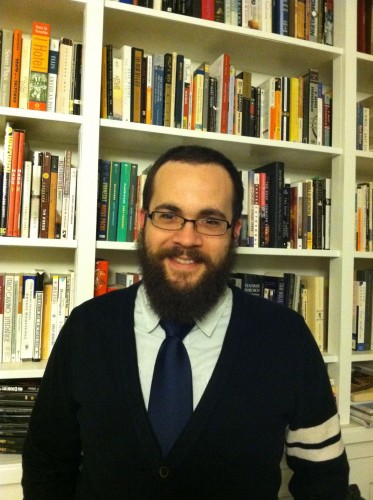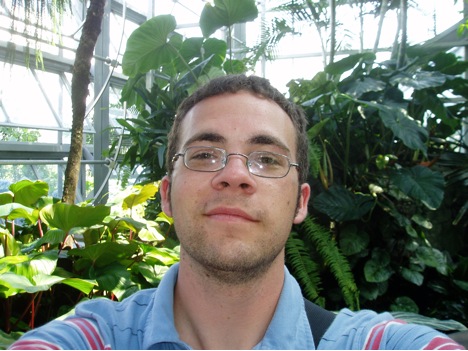Profiles in Gradliness: Kevin Kane

Books have Kevin Kane's back.
Kevin Kane has done a lot for Chicago writers, on-campus and off-, so interviewing him was a no-brainer. The fact that he’s a great guy, a master homebrewer, and the other half of a club I’m in called The Donut Dudez didn’t hurt either. Read on to learn about Kevin’s involvement in publishing The Handshake Magazine, and writing and editing for various on-campus publications.Where did you go to undergrad?
I attended Western Michigan University after earning my associate degree at Kellogg Community College, affectionately called Cornflake U by some, but not by me. I had a great time there before I started at Western where I studied literature for the most part while dabbling in creative writing and linguistics. All around, I took classes with some stellar faculty in all three areas. My minor was in history.
I was in an honors fraternity called Sigma Tau Delta, an English honor society. I was the inaugural president of our chapter, Alpha Nu Pi that continues strong to this day. My department helped fly me and a few other students out to their annual conference in Portland. We had fun joshing around with the initials of said honor society, STD. Since then, I think many more people from the fraternity have jet-setted to more conferences.
While an undergrad, I scored a grant to drive across the country on highway 50 from Ocean City, MD to Sacramento and write about it for my honors thesis. That trip is where I got my beard after I stopped shaving, about a day before this picture. This is me before I went full, facially piratical in the Botanical Gardens in Washington, DC, which 50 cuts neatly through.

What attracted you to Columbia College Chicago?
Well, I knew I was going to be in Chicago and that I wanted to attend a masters writing program to write more and be able to teach at the college level. I surveyed the Chicago colleges, reading websites, attending open houses—the usual. Columbia’s active approach to in-class activity sounded great. I also read a couple of Joe Meno’s books and thought I could learn a lot from him. I also read De Grazia’s American Skin. I liked the youthfulness of those two, that they weren’t sort-of stuff-shirted academics. The writing-class heavy curriculum and the teaching side of the degree both appealed to me.
Tell me about your duties as managing editor of The Handshake.
When Dan Duffy was rolling around ideas for the magazine and getting things underway, he asked if I would be interested in helping out with the fiction portion. That responsibility has grown with the magazine from its infancy to our constantly evolving progress. With a staff as small as we have– mainly Dan and I with sincere and necessary help from a few others– we need to cover all the bases ourselves. My duties include editing, working with the writers, soliciting work, interviewing, transcribing, more editing, marketing, contacting potential advertising, distribution, and the list goes on depending on the need. Dan is terrific to work with, both for his enthusiasm and because this thing is his baby. He really puts in so much effort that I always feel that onus to respond in kind.
We had a great weekend a few months ago at the first Chicago Book Expo in the abandoned Borders in Uptown, manning the table and talking to folks. We’re looking forward to the sold-out AWP conference at the end of this month.
What was your job in the Fiction Writing Department office? What were the benefits of being in the thick of things in the department?
I think the official title started out as project manager, which involved a lot of interesting and wide-ranging projects from research on visiting authors to copy-editing department publications to assisting with archiving years of department files to recording award-winning department alumni and students. Sometimes I also served as receptionist. In other words, the job changed often, but the office always worked terrifically with my schedule, as would be expected.
Getting to meet the faculty and many more students through working there opened up my awareness of the department quite a bit, introducing me to faculty that I might not get to know with the number of classes I would be taking. The full-time faculty and large part-time faculty roster contains a diverse array of interesting people. Talking with many of them, hearing how they ended up there, became an endless source for ideas and knowledge, particularly about the teaching of writing and literature.
Tell me about reading submissions to the Story Week Reader.
I really enjoy reading flash fiction or short-shorts or whatever you want to call that form. The fiction writing department students produce a wide array of talent and subject matter, and I found it thoroughly enjoyable to dig into the many, many stories and essays. Some you fall in love with right away and others contain this kernel of truth for what they’re writing about that, even if the writing might need work. The editorial process for the Story Week Reader, which involves working one-on-one with an editor to revise the piece prior to publication, allows for a heightening of the story—allows that writer time and coaching to produce something quite special.
Luckily, one of my pieces was chosen last year. Though I had taken the piece, “Softness and Light,” through many drafts prior to submission, my editor pushed me to take the story further, leading me toward discoveries about and within the story. When reading submissions for the Reader instead of, say, the Handshake, we get to look for that diamond in the rough instead of the polished gem.
You guest-edited the newest issue of fictionary. Tell me about that experience.
Each issue of fictionary is run by a different managing editor or co-managing editors. I was asked to run this last one. I worked with Bobby Biedrzycki and Sam Weller, the faculty advisors. Bobby and I wanted to highlight the many activities of people doing their own thing here in Chicago, and we decided on DIY literature as a focus.
The experience proved extremely rewarding as many things that take up an inordinate amount of time and effort prove to be once they’re finished. I chose to write a feature as well as head up the edits for the majority of the articles. That combination was a lot. The Fiction Writing department is an active entity here in Chicago, like a giant octopus with its tentacles in many different pots. The analogy is hopefully doubly applicable as our cover, designed by Soule’ Esemplare, an art student here at Columbia, is a giant octopus doing a little DIY of its own. Following those lines of activity—publishing, art books, blogging, magazines, readings, etc (the list could go on for some time), demonstrated the worth not only of the department but of this rich literary scene at home in Chicago. Tons of reading series, magazines, presses, lectures, festivals, even an underground library—this city holds words in high regard. fictionary became a way to highlight some of that.
The magazine functions as both a department newsletter and a legitimate place for journalism about writing. Running this last issue taught me a lot about organization, managing myself as well as other writers (turns out we can be a little slippery, mostly myself), and dealing with the large institution that is Columbia College Chicago.
What do you do for the Graduate Admissions office?
When prospective students express interest in a particular program at Columbia and sign up for materials, they receive short profiles of a student and a faculty member from said program. I write the profiles and coordinate the photography of the professor or student. After conducting research on my subject and their program, I interview them and boil them down into a marketing package that tells the reader something about what it would be like to take a class with them or be in a course with them.
What am I missing? You do a lot!
Along with two fellow graduate students in the Fiction Writing department, Eliza Fogel and Cynthia Vargas, we run the Graduate Writers Association, which we’re trying to use to lend both a voice to graduate students’ needs and expectations as well as try and bring in other departments that are full of great and dedicated writers. Hey English, Poetry, and Nonfiction, we’re talking to you! But everyone’s busy.
Turns out it’s a ton of work to start and run that as well. And dealing with the bureaucracy of Columbia doesn’t help much with that either. That’s no doubt the same anywhere.
I also was lucky enough to be asked to help with the fictionary edition that is the Story Week Festival of Writers program. The program usually contains essays, interviews, and fun facts about the writers coming to give lectures, readings, and sit on panels. My work involved mostly transcribing, editing, and coordinating with writers (like yourself!) and publishers. There are some dynamic and talented folks coming this year, which I’m excited about, particularly Bonnie Jo Campbell coming back. Her book American Salvage really blew me away, reminding me of collections by Carver, Dybek, and, most impressively, Anderson’s Winesburg, OH.
What would you tell a potential Fiction Writing grad student who has an interest in working in publishing?
If you don’t know what is on the other side of the door, you’ll never understand the full cycle of writing to publication. That isn’t to say every writer needs to run a magazine or start a publishing house. That would be ridiculous. But you can learn so much from reading slush or editing a few articles or being part of deciding what will end up in print or online. There are so many ways to be involved and nearly all of them will, if not make you a better writer, at least teach you something intrinsic about the flow chart of writing.
Makes me think of something MFA alum Steve Tartaglione said while discussing editing Knee-Jerk, that you could be reading dozens of mediocre stories but you might come across one that knocks your socks off and makes you want to rush home and write and write. I’m paraphrasing, but finding something like that—something that moves you that almost no one else has ever read and you can be a part of bringing to light is something special.
